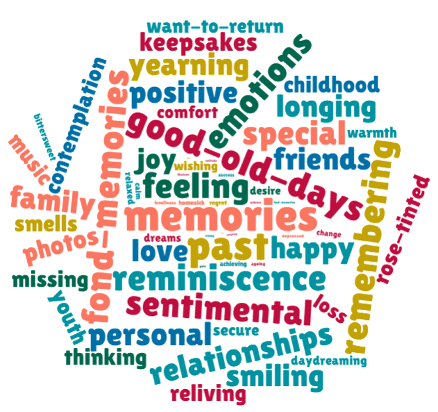What Is Nostalgia?

Nostalgia is defined as “a sentimental longing for the past” or “an affectionate feeling you have for the past, especially for a particularly happy time.” (Oxford English Dictionary, Collins English Dictionary)
*Download the infographic here.*
17th-19th c.: A Medical Supervillain
The word nostalgia comes from the Greek words nostos (“return”) and algos (“pain”) — literally meaning the ache or longing to go home. The term was coined back in 1688 by a Swiss physician Johannes Hofer, who observed that Swiss mercenaries serving far from home for European monarchs often displayed adverse symptoms, such as obsessive thoughts of home, bouts of weeping, anxiety, loss of appetite, and insomnia. Hofer described nostalgia (or homesickness) as "a cerebral disease of essentially demonic cause". This view of nostalgia as a medical condition persisted through the 18th and 19th centuries, though it was no longer believed to affect only the Swiss.
Late 20th c.: Rehabilitation
By the late 20th century, nostalgia had come to be seen as distinct from homesickness by both researchers and the general public. It was redefined — and is still understood today — as a bittersweet emotion triggered by meaningful recollections of one’s past. As the two concepts diverged, research on homesickness began to focus on the emotional challenges people face when adjusting to life away from home. On the other hand, studies of nostalgia shifted towards exploring a more reflective longing for aspects of one’s past, which may include, but is not limited to, one’s homeland.
Present Day: The Feel-Good Force
Nostalgia is now recognised as a universal experience, common across different ages and cultures. Modern research on personal nostalgia shows that drawing on nostalgic memories helps people find meaning and positivity in their past. Revisiting these moments (e.g., by recalling a memory or listening to music) offers important psychological benefits, such as boosting self-worth, strengthening identity, enhancing social connectedness, and fostering optimism and kindness.
Nostalgia also serves a regulatory function, helping to buffer psychological threats. Evidence shows that people often turn to nostalgia when feeling lonely, anxious, bored, or facing major life transitions. In such times, nostalgia counteracts adverse states and helps restore psychological well-being.
2025-2028: A Relationship Superhero?
Nostalgia has been established as a powerful inner resource — something people can draw upon anytime, anywhere, especially in challenging times. Yet, the existing literature tells only half the story: nostalgia is not only personal but also deeply social. It often centres on relationships, arises in conversation, and evokes pro-social feelings, motives, and behaviours. Its benefits, therefore, likely extend to close relationships.
Indeed, preliminary evidence suggests that when people feel nostalgic about their romantic partner, they tend to experience greater relationship satisfaction and commitment.
Building on this, our 3.5-year ESRC-funded project moves beyond personal nostalgia to explore shared nostalgia in romantic couples. Partnering with charities and practitioners, we aim to test whether, when, and why nostalgia can act as a relationship superhero that helps couples stay resilient against relational threats.